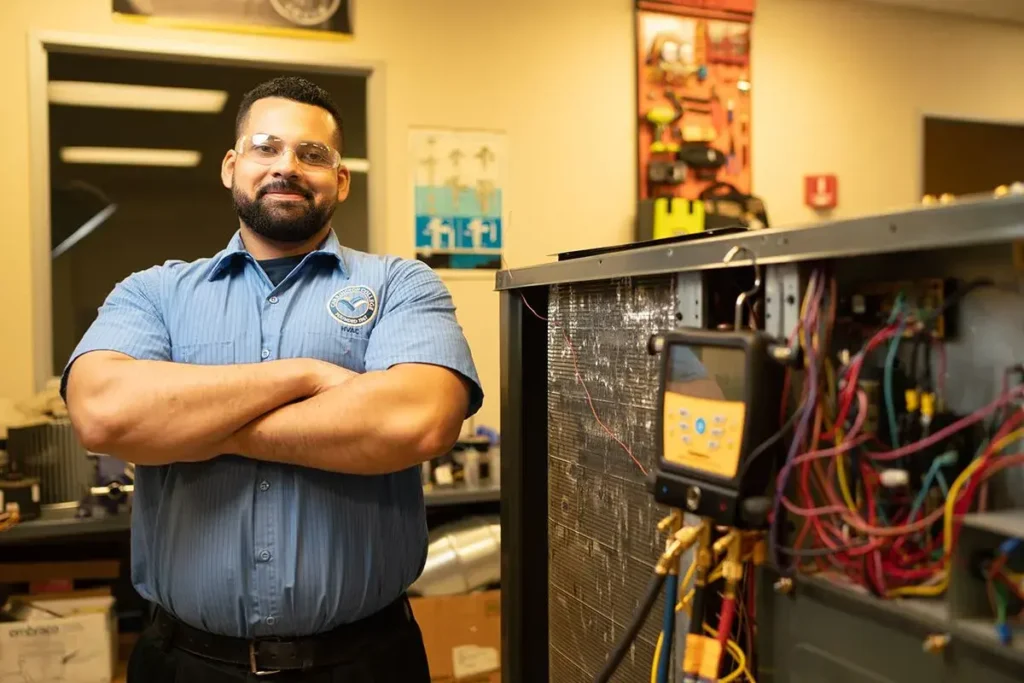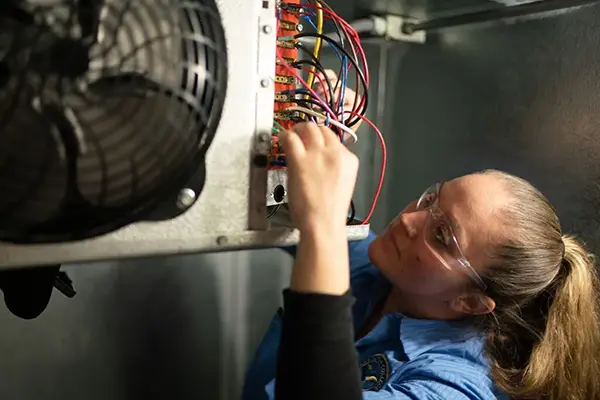Career Guide for HVAC Technicians: How and Why to Join HVAC
Request Information
All fields using an asterik (*) are required.
If you enjoy mathematics, mechanics and hands-on work, you may enjoy a career as a heating, ventilation and air conditioning (HVAC) technician. These professionals apply their knowledge of machines, building construction and electrical design to install and repair heating, ventilation, air conditioning and refrigeration (HVAC-R) systems. They make sure buildings’ heating and cooling systems are functioning properly.
This career guide has everything you need to know about HVAC technicians. Learn about HVAC job duties, steps to become an HVAC technician, HVAC training, HVAC technician jobs and more.
What Is an HVAC Technician?
An HVAC-R technician ensures heating, ventilation, air conditioning and refrigeration systems function properly. They work in homes, schools, offices, factories, hospitals and other buildings. Some choose to specialize in one or more areas of HVAC-R, such as heating systems, commercial refrigeration, testing and balancing, or solar panels.1
When comparing an HVAC installer vs. HVAC technician, the two have slightly different roles. HVAC installers focus on installing HVAC systems and wiring, while an HVAC technician focuses more on the maintenance, repair and cleaning of HVAC systems. Some people compare HVAC installer vs. technician careers and choose to specialize in one. However, depending on your HVAC training and career path, your role may include a mix of installation and maintenance duties.
What Do HVAC Technicians Do?
Heating, air conditioning, and refrigeration mechanics and installers—often called HVAC-R technicians— work on heating, ventilation, cooling, and refrigeration systems. They may work in tight spaces and extremely hot or cold environments because of the broken heating or cooling systems they’re fixing.1 It’s also common for these technicians to work overtime or irregular hours during heating and cooling seasons, the Bureau of Labor Statistics (BLS) reports.2
According to the BLS and O*NET Online, some common HVAC technician job duties include:3 4
- Install HVAC-R systems, wiring, and electrical elements
- Maintain HVAC-R systems
- Clean ducts, change filters, and refill refrigerant
- Repair or replace old or broken parts
- Test and inspect HVAC-R systems
- Check pipes for leaks
- Evaluate electrical parts of HVAC-R systems
- Maintain records of work performed
- Recommend maintenance efforts to better HVAC-R performance
- Sell maintenance service contracts to clients
- Follow refrigerant conservation and recycling regulations
HVAC-R technicians also troubleshoot repairs and maintain commercial refrigerators, freezers, and ice machines.
HVAC-R technicians may work with other individuals to install and maintain heating and cooling systems. Especially for large projects, they may work with sheet metal workers, electricians, boilermakers, and/or plumbers and pipefitters. 3
 Why Become an HVAC Technician?
Why Become an HVAC Technician?
Heating, Air Conditioning, and Refrigeration Mechanics and Installers have a positive job outlook.5 The BLS notes that the construction of commercial and residential buildings will likely drive the growth of HVAC technician jobs. The increasing number of climate-control systems and focus on energy efficiency may also increase demand for HVAC technicians.
Best States To Work as an HVAC Technician
Below are the states with the highest level of employment for heating, air conditioning, and refrigeration mechanics and installers, as reported by the BLS in May 2022.6
| State | Employment | Employment per thousand jobs |
| California | 38,370 | 2.18 |
| Florida | 33,560 | 3.64 |
| Texas | 30,670 | 2.36 |
| New York | 20,150 | 2.21 |
| Pennsylvania | 17,730 | 3.05 |
How to Become an HVAC-R Technician
Though everyone’s career path looks a little different, below are four steps you can take to become an HVAC technician.
- Obtain a high school diploma or equivalent. Earning a high school diploma or GED is the first step toward preparing for this career field. The BLS recommends taking high school courses in vocational training, physics, and math.7 Developing your knowledge of electrical work or plumbing is also beneficial for this career.
- Complete an HVAC-R program. Many people enroll in HVAC technician training through a college or trade school to learn heating, ventilation, AC, and refrigeration skills. These programs typically last six months to two years and lead to a certificate or associate degree.
- Gain training and experience. Through your HVAC-R program, you’ll gain hands-on experience through in-program experiential learning opportunities.
- Earn licenses and certifications as needed. Some states require HVAC-R technicians to be licensed. Check your state and local area’s requirements to see if you need to become licensed. According to the BLS, the U.S. Environmental Protection Agency (EPA) requires technicians who work with refrigerant-cooling systems to be certified in appropriate refrigerant handling (more on this below).7
Do I Need to Do an HVAC Apprenticeship?
No, you don’t need an apprenticeship—but you will want training and experience. Some people choose to complete an apprenticeship to gain HVAC training and experience. HVAC apprenticeships typically last three to five years and are sponsored by groups such as unions and contractor associations, the BLS reports.7
Do I Need to Join a Union to Work in HVAC?
No, you don’t need to join a union to work in HVAC. However, joining a union is an option. According to Union Plus, a non-profit committed to providing valuable benefits to union members, the main benefit of joining a union is having representation when it comes to your pay, hours, benefits, and workplace safety.8 If you’re interested in joining an HVAC union, search for unions in your area.
 What Skills Should I Have?
What Skills Should I Have?
In addition to HVAC-R knowledge, there are other skills that can help you succeed in HVAC technician jobs. According to the BLS, below are some important skills for HVAC technicians to have.7
- Customer service: As an HVAC technician, you’ll often work in customers’ homes and businesses, so it’s important to be polite and punctual. You’ll also have to deal with upset customers from time to time.
- Attention to detail: HVAC technicians need to keep detailed records of the work they’ve performed—including what was done, how long it took, and what equipment and parts were used.
- Math skills: You’ll need math skills to calculate accurate load requirements so HVAC-R equipment heats or cools properly.
- Time management: HVAC technicians should be able to stay on schedule and complete the necessary work as they respond to daily maintenance calls.
- Physical strength and stamina: HVAC technicians need the strength and stamina to meet the physical demands of their job. They may lift heavy equipment and spend a lot of time on their feet during work hours.
Where Can I Work as an HVAC Technician?
You can work in many settings as an HVAC technician. As previously mentioned, many HVAC technicians install and maintain HVAC systems in homes, schools, offices, factories, hospitals, and other buildings. For some HVAC technician jobs, you’ll stay on one job site all day; for others, you’ll travel to multiple job sites throughout the day. Job sites may be indoors or outdoors.
There are many ways to find HVAC technician jobs. You may work for an HVAC or contracting company, join a union, or become self-employed and start your own HVAC business.
Consider reading HVAC technician job descriptions to see what types of jobs interest you.
According to the BLS, the largest employers of heating, air conditioning, and refrigeration mechanics and installers in 2022 were:12
- Plumbing, heating, and AC contractors— 67%
- Self-employed individuals— 8%
- Wholesale trade— 3%
- State, local, and private educational services— 3%
- Retail trade— 3%
How Should I Choose HVAC Technician Training?
Choosing the right HVAC technician training for you is an important decision. When searching for HVAC training, you may consider attending an HVAC school or completing an HVAC apprenticeship. Below are some factors to consider when choosing the right HVAC training for you.
- Curriculum: Whether you’re comparing HVAC-R programs or apprenticeships, the curriculum is key. Are installation procedures, electrical concepts, and critical thinking skills prioritized in the curriculum? Make sure the program will teach you foundational skills in installing, repairing, and maintaining HVAC systems.
- Hands-on training: Gaining hands-on experience is an important part of HVAC technician training. In addition to HVAC training classes, does the program offer opportunities for hands-on training?
- Cost: HVAC training is a substantial investment of your time and money—but it’s an important one. If you’re considering HVAC-R programs, ask about financial aid opportunities to offset the cost of education. At Carrington College, we participate in many state and federal financial assistance programs. Student finance options such as loans, grants and scholarships are available to those who qualify.
- Duration: How quickly do you want to complete an HVAC training? Depending on your goals, program duration may be an important factor to consider. Finishing HVAC technician training typically takes less time than completing an HVAC apprenticeship. At Carrington College, you can earn your Heating, Ventilation, Air Conditioning and Refrigeration Certificate of Achievement in as few as 10 months.
Can I Study HVAC Training Online?
You can learn some aspects of HVAC training online, but this is a hands-on career. Once you learn about heating, ventilation, air conditioning, and refrigeration concepts, it’s important to apply your knowledge through real-world, hands-on experience.
What Will I Learn in the Heating, Ventilation, Air Conditioning and Refrigeration Program at Carrington College?
The Carrington College Heating, Ventilation, Air Conditioning and Refrigeration program prepares students to work in the heating and cooling industry. Training focuses on theories of heating, refrigeration, and air conditioning. Students study the operation, maintenance, and repair of residential and commercial equipment.
The program consists of 40 semester credit hours and culminates in a Certificate of Achievement. Below are a few examples of courses you’d take at Carrington College.
- HVACR101 Theory and Applications of Refrigeration: This course introduces, discusses, and practices the physical laws of matter, heat transfer, gas laws and equations, pressure and temperature conversions, refrigerants and refrigerant recovery-recycle-reclaim methods and equipment. The refrigeration cycle, basic refrigerating systems and applications, codes, installation, safety practices, and EPA information are topics covered in this course. This course discusses and applies the principles of theory and fundamentals to problem analysis and diagnostics for residential, light commercial, and commercial refrigeration systems. Students will practice the basics of brazing.
- HVACR103 Advanced Air Conditioning: This course applies pictorial and schematic wiring diagrams, interpretation and various techniques for problem analysis and troubleshooting of air conditioning and heating units. Students will work with gas and propane furnaces, refrigerant recovery/recycling practices, proper evacuation procedures, major component replacement and brazing techniques, leak testing methods, system charging procedures, system performance analysis, problem analysis, diagnostics and repair procedures for heating and air conditioning systems including heat pumps.
- HVACR105 Advanced Electricity: This course applies pictorial and schematic wiring diagrams, interpretation, problem analysis and the application of diagnostic troubleshooting techniques for domestic and light commercial refrigeration and air conditioning circuits.
Learn More About HVAC-R Training at Carrington College
The Heating, Ventilation, Air Conditioning and Refrigeration program at Carrington College provides you with the skills and hands-on training for a career in the heating and cooling industry. If you’re ready to prepare for HVAC technician jobs, you can earn a Heating, Ventilation, Air Conditioning and Refrigeration certificate at our Trades Education Center in Phoenix.
Learn more about our Heating, Ventilation, Air Conditioning and Refrigeration training program, and request more information today.
Sources:
- www.bls.gov/ooh/installation-maintenance-and-repair/heating-air-conditioning-and-refrigeration-mechanics-and-installers.htm#tab-1
- www.bls.gov/ooh/installation-maintenance-and-repair/heating-air-conditioning-and-refrigeration-mechanics-and-installers.htm#tab-5
- www.bls.gov/ooh/installation-maintenance-and-repair/heating-air-conditioning-and-refrigeration-mechanics-and-installers.htm#tab-2
- www.onetonline.org/link/summary/49-9021.01
- www.bls.gov/ooh/installation-maintenance-and-repair/heating-air-conditioning-and-refrigeration-mechanics-and-installers.htm#tab-6
- www.bls.gov/oes/current/oes499021.htm
- www.bls.gov/ooh/installation-maintenance-and-repair/heating-air-conditioning-and-refrigeration-mechanics-and-installers.htm#tab-4
- www.unionplus.org/page/what-union
- www.epa.gov/section608/section-608-technician-certification-0
- www.natex.org/site/1/Home
- www.escogroup.org/hvac/
- www.bls.gov/ooh/installation-maintenance-and-repair/heating-air-conditioning-and-refrigeration-mechanics-and-installers.htm#tab-3
Last Updated:
December 19, 2023
WANT TO LEARN MORE?
Request Information
All fields using an asterik (*) are required.